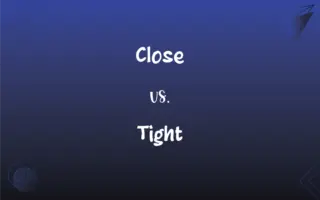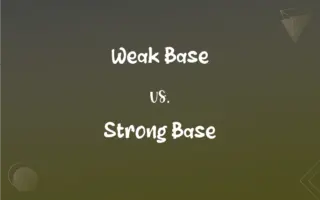Thereby vs. Therefore: What's the Difference?
Edited by Aimie Carlson || By Janet White || Published on January 16, 2024
"Thereby" implies a method or means ("by that means"), while "therefore" indicates a conclusion or result ("for that reason").

Key Differences
"Thereby" is used to indicate the method or process by which something is achieved, implying 'by that means' or 'as a result of that'. "Therefore" is used to denote a conclusion, often used in the sense of 'for that reason' or 'consequently'.
In usage, "thereby" often introduces the means or cause of an action in a sentence. In contrast, "therefore" introduces a conclusion or result that follows logically from a previous statement.
"Thereby" is typically followed by a verb phrase, indicating the action through which the result is achieved. "Therefore" is usually followed by a comma and completes a thought, providing the logical result of the previous statement.
An example of "thereby" is: "He studied hard, thereby passing the exam." Here, it connects the action of studying to the result of passing. An example of "therefore" is: "It was raining, therefore the event was canceled," where it connects the condition of rain to the conclusion of canceling the event.
"Thereby" often relates to a direct consequence of an action, while "therefore" is more about deducing a conclusion or a reasoning outcome from a given set of facts or statements.
ADVERTISEMENT
Comparison Chart
Meaning
Indicates the method or process.
Indicates a conclusion or result.
Usage
Follows an action to show consequence.
Follows a statement to show logical result.
Typical Position
Often followed by a verb phrase.
Usually precedes a complete thought or sentence.
Example Function
Shows how something is done.
Shows why something happens.
Connection
Direct consequence of an action.
Logical deduction or reasoning from a statement.
ADVERTISEMENT
Thereby and Therefore Definitions
Thereby
Through that action.
They reduced expenses, thereby increasing profits.
Therefore
Hence.
He did not study, therefore he failed the exam.
Thereby
As a result of that.
She practiced daily, thereby mastering the piano.
Therefore
Consequently.
She was the highest scorer, therefore she received the award.
Thereby
By that means.
He saved money, thereby avoiding debt.
Therefore
For that reason.
It was raining, therefore the game was postponed.
Thereby
In that way.
The system was simplified, thereby improving efficiency.
Therefore
As a result.
The road was blocked, therefore we took a detour.
Thereby
By that means; because of that.
Therefore
Due to that.
The store was closed, therefore we shopped elsewhere.
Thereby
In connection with that
"And thereby hangs a tale" (Shakespeare).
Therefore
For that reason or cause; consequently or hence.
Thereby
(formal) By it; by that; by that means, or as a consequence of that.
Therefore
(conjunctive) Consequently, by or in consequence of that or this cause; referring to something previously stated.
Traditional values will always have a place. Therefore, they will never lose relevance.
Thereby
By that; by that means; in consequence of that.
Acquaint now thyself with him, and be at peace; thereby good shall come unto thee.
Therefore
For that; for it (in reference to a previous statement)
Thereby
Annexed to that.
Therefore
For that or this reason, referring to something previously stated; for that.
I have married a wife, and therefore I can not come.
Behold, we have forsaken all, and followed thee; what shall we have therefore?
Thereby
Thereabout; - said of place, number, etc.
Therefore
Consequently; by consequence.
He blushes; therefore he is guilty.
Thereby
By that means or because of that;
He knocked over the red wine, thereby ruining the table cloth
Therefore
(used to introduce a logical conclusion) from that fact or reason or as a result;
Therefore X must be true
The eggs were fresh and hence satisfactory
We were young and thence optimistic
It is late and thus we must go
The witness is biased and so cannot be trusted
Thereby
Consequently, in that respect.
He won the award, thereby gaining recognition.
Therefore
As a consequence;
He had good reason to be grateful for the opportunities which they had made available to him and which consequently led to the good position he now held
FAQs
What does 'thereby' mean?
It means 'by that means' or 'as a result of that'.
Is 'thereby' formal?
Yes, it's more common in formal writing.
Can 'thereby' start a sentence?
Rarely; it usually follows an action or statement.
Does 'thereby' imply causation?
It implies a direct consequence or method.
Can 'therefore' be used in casual speech?
Yes, though it's more formal.
Where does 'therefore' usually appear?
At the beginning or middle of a sentence.
Are 'thereby' and 'therefore' interchangeable?
No, they serve different purposes.
How is 'thereby' used in a sentence?
To show the method or consequence of an action.
What does 'therefore' signify?
A conclusion or result from a previous statement.
Can 'thereby' indicate causality?
Yes, it can suggest a cause-effect relationship.
Is 'therefore' used in arguments?
Yes, to present logical conclusions.
Is 'therefore' a conjunction?
It's more of a conjunctive adverb linking ideas.
Does 'therefore' require a comma?
Often, especially when starting a sentence.
Is 'therefore' always conclusive?
Generally, it indicates a conclusion or result.
Can 'thereby' be used in legal documents?
Yes, it's common in legal and formal writing.
Do 'thereby' and 'therefore' have synonyms?
Yes, like 'consequently', 'thus', etc.
Should 'therefore' be used sparingly?
Yes, to avoid over-formalizing speech or writing.
Can 'thereby' be replaced with 'thus'?
In some contexts, but 'thus' is broader.
Is 'therefore' a sign of cause and effect?
More of a logical result than direct cause.
Can 'thereby' come after a comma?
Usually, it follows a clause or action.
About Author
Written by
Janet WhiteJanet White has been an esteemed writer and blogger for Difference Wiki. Holding a Master's degree in Science and Medical Journalism from the prestigious Boston University, she has consistently demonstrated her expertise and passion for her field. When she's not immersed in her work, Janet relishes her time exercising, delving into a good book, and cherishing moments with friends and family.
Edited by
Aimie CarlsonAimie Carlson, holding a master's degree in English literature, is a fervent English language enthusiast. She lends her writing talents to Difference Wiki, a prominent website that specializes in comparisons, offering readers insightful analyses that both captivate and inform.































































